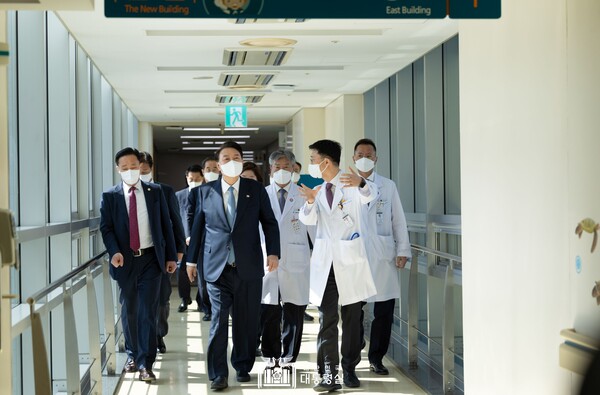In a move to address the ongoing concerns within the Korean medical community regarding the expansion of the medical school admission quota, President Yoon Suk Yeol met with healthcare professionals on Monday, urging them to consider future generations and engage in dialogue without insisting on maintaining the current cap on medical school admissions.

During his visit to Asan Medical Center, President Yoon highlighted his administration's proposal to increase the medical school quota by 2,000, emphasizing the importance of trust and cooperation in achieving healthcare reform.
This visit marks his first direct engagement with the medical community since the announcement of medical reform policies in February.
"There are opinions suggesting a phased increase, and while it would have been better if it had been carried out gradually over a long time, the issue had been delayed for so long as previous administrations avoided the subject due to political risk concerns."
The country cannot keep experiencing this kind of difficulty every time, Yoon added.
Yoon stressed that his administration would ensure that the reduction in the quality of medical services, which doctors are worried about, would not happen.
"For the completion of medical reform, doctors and nurses, who know the field best, need to provide their opinions on what is lacking and what improvements are needed," the president said. "The government will make sure that medical personnel in essential medical fields receive fair compensation and feel rewarded for their work, and that hospitals do not face financial difficulties."
Yoon also proposed policy support measures for essential and critical medical fields, stating, "We are considering further elevating the policy support fees for pediatrics and obstetrics, which were increased last year, to include not only initial visits but also follow-up visits."
"The fields of essential and critical medical care, which protect the health and lives of the citizens, are as important as national defense," he said. "Just as we should not spare expenses for national security, we will not skimp on the budget for the lives of our citizens."
The government will also establish a clear compensation system for the treatment of critical patients in tertiary hospitals, he added.
In line with Yoon's remarks, the government also announced a comprehensive overhaul of the current fee-for-service payment system, which has been criticized for encouraging excessive treatments and failing to compensate for more complex medical services adequately.
The Ministry of Health and Welfare on Monday convened a meeting to discuss the transition to a value-based payment system aimed at enhancing the sustainability of the national health insurance system and addressing the imbalances in medical compensation.
The government plans to revise the system to reflect the complexities and necessities of various medical procedures.
"We intend to innovate our payment system to a value-based approach to overcome the limitations of the current fee-for-service system and ensure the sustainability of our health insurance," Health and Welfare Vice Minister Park Min-soo said.
This reform is part of a broader initiative to invest over 10 trillion won ($7.4 billion) in essential medical services by 2028, focusing on short-staffed specialties and enhancing cooperation between medical institutions.
The investment plan, termed 'pinpoint compensation,' will allocate over 5 trillion won compensated in fields that suffer from a high complexity and shortage in medical supply, such as burn, reattachment surgery, pediatric surgery, and transplant surgery, as well as severe internal diseases.
Additionally, more than 3 trillion won will be dedicated to fields affected by declining demand due to low birth rates, such as pediatrics and obstetrics.
Another 2 trillion won is planned to maximize treatment outcomes through medical institution cooperation networks such as cerebral and cardiovascular networks and severe pediatric care networks.
Amid concerns over the financial sustainability of health insurance, the health ministry assured that the planned reforms and investments will not lead to depletion of the health insurance fund.
"The accumulated reserves of the health insurance fund stand at 28 trillion won, and we plan to invest more than 10 trillion won from this amount," Park said. "Maintaining the fee-for-service system would make it difficult to handle the increasing healthcare expenses due to aging, which is why we are attempting this reform."
Related articles
- 350 delayed surgeries reported in 1 month after trainee doctors left hospitals
- [Contribution] Truth about medical professors’ resignations
- Court to decide whether to suspend medical student increase as early as Friday this week
- 'Junior doctors defying Seoul's return-to-work order could face legal liability for medical error'
- Korea announces largest medical school expansion in nearly 3 decades to boost regional healthcare
- Korea to boost funding for surgeries on severely ill children by up to 1,000%
- Appalled by President Yoon's speech, trainee doctors harden resolve to resign

